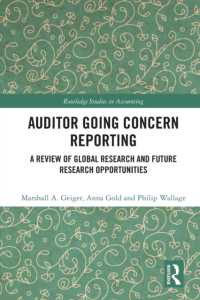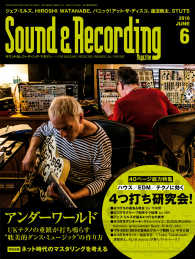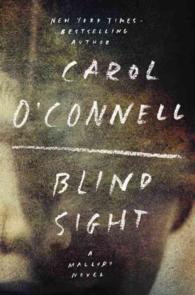- ホーム
- > 洋書
- > 英文書
- > Cinema / Film
基本説明
The book combines a series of chapters considering a range of responses to the idea of 'de-westernizing' film studies with a series of in-depth interviews with filmmakers, scholars and critics.
Full Description
De-Westernizing Film Studies aims to consider what form a challenge to the enduring vision of film as a medium - and film studies as a discipline - modelled on 'Western' ideologies, theoretical and historical frameworks, critical perspectives as well as institutional and artistic practices, might take today. The book combines a range of scholarly writing with critical reflection from filmmakers, artists & industry professionals, comprising experience and knowledge from a wide range of geographical areas, film cultures and (trans-)national perspectives. In their own ways, the contributors to this volume problematize a binary mode of thinking that continues to promote an idea of 'the West and the rest' in relation to questions of production, distribution, reception and representation within an artistic medium (cinema) that, as part of contemporary moving image culture, is more globalized and diversified than at any time in its history. In so doing, De-Westernizing Film Studies complicates and/or re-thinks how local, national and regional film cultures 'connect' globally, seeking polycentric, multi-directional, non-essentialized alternatives to Eurocentric theoretical and historical perspectives found in film as both an artistic medium and an academic field of study.
The book combines a series of chapters considering a range of responses to the idea of 'de-westernizing' film studies with a series of in-depth interviews with filmmakers, scholars and critics.
Contributors: Nathan Abrams, John Akomfrah, Saër Maty Bâ, Mohammed Bakrim, Olivier Barlet, Yifen Beus, Farida Benlyazid, Kuljit Bhamra, William Brown, Campbell, Jonnie Clementi-Smith, Shahab Esfandiary, Coco Fusco, Patti Gaal-Holmes, Edward George, Will Higbee, Katharina Lindner, Daniel Lindvall, Teddy E. Mattera, Sheila Petty, Anna Piva, Deborah Shaw, Rod Stoneman, Kate E. Taylor-Jones
Contents
Foreword: Graeme Harper Introduction: De-Westernizing Film Studies Part 1: (Dis-)continuities of the Cinematic Imaginary: (Non-)Representation, Discourse and Theory Chapter 1: Imagi[ni]ng the Universe: Cosmos, Otherness and Cinema Chapter 2: Questioning Discourses of diaspora: "Black" Cinema as Symptom Chapter 3: Affective Passions: The Dancing Female Body and Colonial Rupture in Zouzou (1934) and Karmen Geï (2001) Chapter 4: African Frameworks of Analysis for African Film Studies Part 2: Narrating the (Trans)Nation, Region and Community from Non-Western Perspectives Chapter 5: De-westernizing national cinema: re-imagined communities in the films of Férid Boughedir Chapter 6: Banal Transnationalism: On Makhmalbaf's "Borderless" Filmmaking Chapter 7: Griots and Talanoa Speak: Storytelling as Theoretical Frames in African and Pacific Island Cinemas Chapter 8: The Intra-East Cinema: the re-framing of an East Asian Film Sphere Part 3: New (dis-)continuities from 'within' the West Chapter 9: "A double set of glasses": Stanley Kubrick and the Midrashic Mode of Interpretation Chapter 10: Situated Bodies, Cinematic Orientations: Film and (Queer) Phenomenology Chapter 11 Has film ever been Western? Continuity and the question of building a "common" cinema Part 4: interviews Editors' note on interviews Chapter 12: "There is No Entirely Non-Western Place Left ": De-Westernizing the moving image, an interview with Coco Fusco Chapter 13: De-Westernizing Film through Experimental Practice: an interview with Patti Gaal-Holmes Chapter 14: "With Our Own Pen and Papers": an interview with Teddy E. Mattera Chapter 15: "To Colonize a Subject Matter is to Learn Nothing from it": an interview with Jonnie Clementi-Smith Chapter 16: "Isn't It Strange that 'World' means Everything Outside the West?": an interview with Rod Stoneman Chapter 17: Beyond Stereotypes and Preconceptions: an interview with Farida Benlyazid Chapter 18: "About Structure, Not about Individual Instances": an interview with Daniel Lindvall Chapter 19: "Still Waiting for a Reciprocal De-Westernization": an interview with Mohammed Bakrim Chapter 20: "Moving Away from a Sense of Cultures as Pure Spaces ": an interview with Deborah Shaw Chapter 21: Nu Third Queer Cinema: an interview with Campbell X Chapter 22: "To Start with a Blank Slate of Free Choices": an interview with Kuljit Bhamra Chapter 23: "The Crazy Dream of living without the Other": an interview with Olivier Barlet Chapter 24: "De-Westernizing as Double Move": an interview with John Akomfrah







